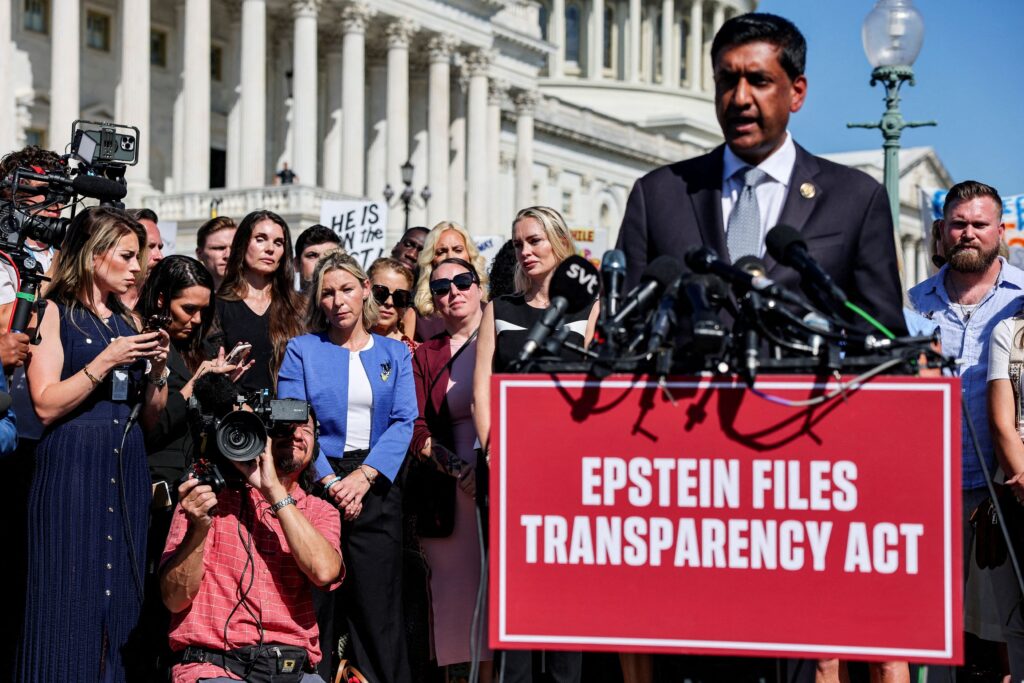House Speaker Mike Johnson (R-Louisiana) predicted that a bill to compel the Justice Department to release files related to deceased sex offender Jeffrey Epstein would pass his chamber nearly unanimously Tuesday with his support – though he continued to argue that there are problems with the legislation that need to be addressed before it becomes law.
Johnson said he has spoken to Senate Majority Leader John Thune (R-South Dakota) about amending the bill — which Johnson called a “political stunt” by Democrats — to include additional protections for victims mentioned in the files who want to remain anonymous.
“I think it could be close to a unanimous vote [in the House], because everybody here, all the Republicans, want to go on record to show they’re for maximum transparency,” Johnson said. “But they also want to note that we’re demanding that this stuff get corrected before it is ever moved through the process and is completed.”
House passage would be the remarkable culmination of a bipartisan crusade by Reps. Thomas Massie (R-Kentucky) and Ro Khanna (D-California) that until Sunday had met fierce resistance from President Donald Trump, who repeatedly insisted that the focus on the Epstein files was a “hoax” promoted by Democrats.
“Because survivors spoke up, because of their courage, the truth is finally going to come out,” Khanna said at a news conference where he and other lawmakers were joined by about a dozen Epstein accusers. “ … I expect an overwhelming vote in the House of Representatives.”
Republicans across the ideological spectrum are expected to join Democrats in voting in favor of more transparency from the Justice Department.
As it became increasingly clear he could lose the House vote, Trump reversed course Sunday, urging Republicans in a social media post to support the bill, which would compel officials at the Justice Department to release all unclassified records, documents, communications and investigative materials relating to the investigation and prosecution of Epstein in its possession. Trump said Monday that he would sign the bill if it reaches his desk.
Thune has not said publicly whether the Senate will take up the Epstein bill. It would need 60 votes to overcome a filibuster in the chamber. Supporters of the legislation are hopeful that the strong House vote will pressure the Senate to move forward. Sen. Jacky Rosen (D-Nevada), in a letter last week, urged Thune to “proceed expeditiously” once the legislation clears the House.
If Thune does not bring the Epstein bill to the floor, any senator could try to pass it by unanimous consent — which would allow it to pass as long as no senator objects.
The Justice Department has not said how it would respond to congressional requests to release the Epstein files, but Attorney General Pam Bondi and her deputies have previously said that they cannot release materials related to ongoing investigations. Earlier this week, Trump called on the Justice Department on Friday to examine the relationships between Epstein and several prominent Democrats, including former president Bill Clinton, and Attorney General Pam Bondi quickly tapped federal prosecutors in Manhattan to take on the job.
“The real test will be will the Department of Justice release the files, or will it all remain tied up in investigations?” Rep. Marjorie Taylor Greene (R-Georgia) said at Tuesday’s news conference with Epstein accusers.
The House vote is the result of a discharge petition — a mechanism by which House lawmakers can circumvent the normal legislative process to compel votes. The petition received the 218th signature needed to force a vote on the Epstein files last week after newly sworn-in Rep. Adelita Grijalva (D-Arizona) joined the effort, which included all 214 Democrats in the chamber and four Republicans: Reps. Lauren Boebert (Colorado), Nancy Mace (South Carolina), Massie and Greene.
Massie and Khanna introduced the petition in July. Their press for greater transparency surrounding the Epstein case included two news conferences with Epstein’s victims, one in early September and the second one on Tuesday.
As they did in September, several of the Epstein accusers who spoke Tuesday implored the full release of the Justice Department files and insisted that it should be a nonpolitical issue.
This time, however, many of their remarks about Trump and his handling of the matter were much more pointed.
Haley Robson, an accuser who said she was a Republican, accused Trump of stonewalling the release of the files.
Trump and White House lieutenants for months tried to convince congressional Republicans to back away from the Epstein inquiry. In a bid to thwart a floor vote, Trump personally whipped votes against the discharge petition in both private and public, according to two people familiar with the effort who spoke on the condition of anonymity to detail private conversations.
Trump has the authority to direct the Justice Department to release the documents in its possession, as he previously has with documents related to the government investigations into the assassinations of the Kennedys and Martin Luther King Jr. Trump has not explained why he has not taken that step, and the White House did not respond to questions about why the release is contingent on a vote from Congress.
The House vote is one of two efforts underway to force more disclosure of the Epstein files.
House Oversight Chair James Comer (R-Kentucky) subpoenaed the Justice Department after one of the panel’s subcommittees voted to compel the department to release the files.
Comer has since broadened his probe into Epstein’s investigation by subpoenaing Epstein’s estate in August. The estate’s attorneys released the “birthday book,” which featured dedications from Epstein’s high-profile associates collected and given to him by his ex-partner Ghislaine Maxwell, who is serving a 20-year sentence in federal prison for sex-trafficking.
The House released another tranche of files last week from Epstein’s estate that included additional emails mentioning Trump.
The president has said that he knew Epstein socially in Palm Beach and that they had a falling-out in the mid-2000s. Trump’s name appears repeatedly in previously released documents from Epstein’s estate, but Trump has maintained that he had “no idea” about Epstein’s criminal behavior, and the documents have produced no evidence of wrongdoing by Trump.
Natalie Allison, Maegan Vazquez and Perry Stein contributed to this report.
The post Johnson predicts near-unanimous House vote on bill to release Epstein files
appeared first on Washington Post.




